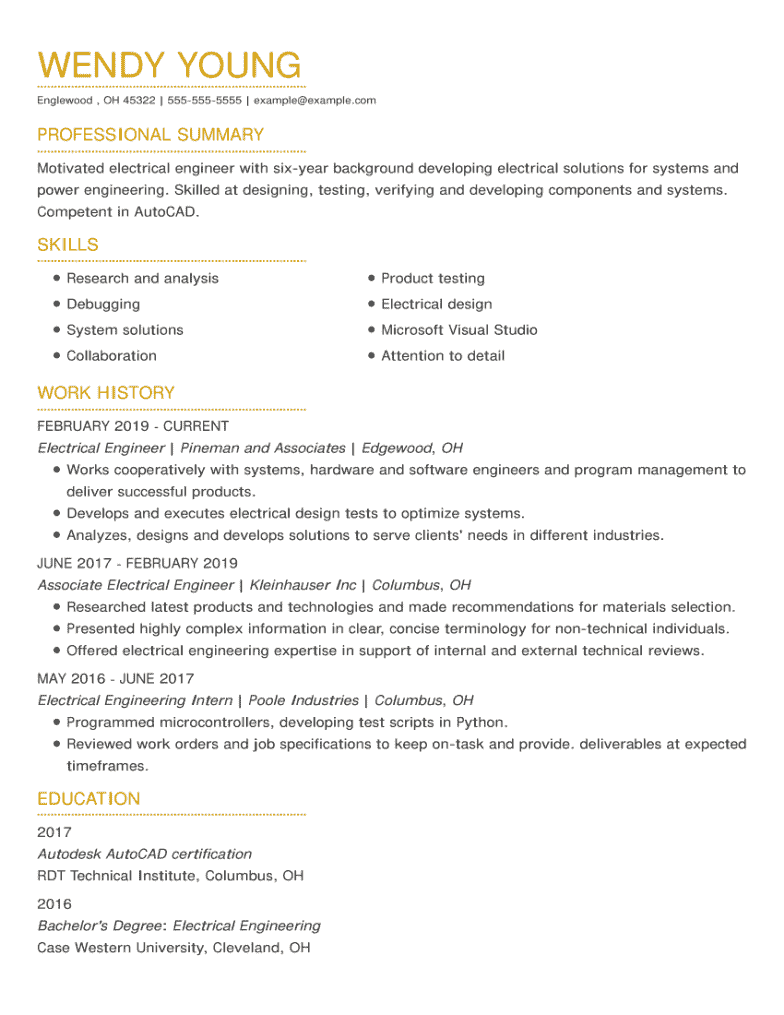Electrical engineering CV examples and writing guide
Create a custom electrical engineering CV in minutes with CVHelp’s tips and examples. Catch the attention of recruiters and hiring managers to secure your next job.
Create a custom electrical engineering CV in minutes with CVHelp’s tips and examples. Catch the attention of recruiters and hiring managers to secure your next job.





OUR USERS HAVE BEEN HIRED BY

Engineers who work with electrical systems are in high demand, but you’ll still need an excellent CV to land the right job. Use these electrical engineer CV samples to create your own professional CV in just minutes.
This guide will show you:
During your job search, you may see different jobs for electrical engineers. Some common titles for engineers who work with electrical systems include:
These CV tips and examples will help you create your own professional CV from start to finish.
A hiring manager or recruiter may use an applicant tracking system (ATS) to scan your CV based on these factors:
Do: Address keywords from the job posting (skills and major requirements) throughout your CV.
Don’t: Just copy the job description or responsibilities word for word.
The best place for your contact information is the header of your CV. The hiring manager should be able to easily locate your information to set up an interview.
Do: Include work-friendly social media or a portfolio that displays your technical skills.
Don’t: Include social media accounts that are password protected or contain unprofessional images or content.
A professional summary is a short statement about the work you have done in the past. A career objective includes this as well as your goals for the job if you get hired. Which one you choose to use can depend on how many years of experience you have in the industry already. Use this section to focus on the value you can bring to the company.
Do: Experienced electrical engineer with expertise in designing circuits and troubleshooting power systems at a Fortune 500 company. Upgraded systems using AutoCAD to reduce maintenance time by 30%. Seeking a senior electrical engineer position with XYZ company in order to expand my skill set in a new environment and contribute to innovation in the auto industry.
Don’t: I am looking for an electrical engineer position paying $60,000 or more per year.
Some soft skills and hard skills you may include on an electrical engineering CV are:
Do: Be specific in your skills section. List skills relevant to the position, especially if they are listed in the job description. Make an impact by using bullet points to list your most impressive skills.
Don’t: Dilute your skills section with basic computer skills or skills unrelated to the position.
The way your work history is formatted can help to display your expertise. The correct format will make your CV easy to read.
Do: Entry Level Electrical Engineer: Use functional CV format or combination CV format to emphasise your skills and training.
Do: Senior Electrical Engineer: Use reverse-chronological CV format or combination CV format to highlight your professional experience.
Don’t: Hide or mislead the reader about gaps in your employment or your years of experience in the field.
The best cv will be customised for each job opening. This helps the hiring manager to assess your skills and experience. By editing your CV for keywords used in the job posting, you can enhance your chances of getting an interview.
Yes. In addition to your CV, you should create a new cover letter for each job. You can use CVHelp’s Cover Letter Builder as a guideline to create a cover letter in just minutes. A cover letter will help to give the hiring manager a more comprehensive view of who you are. A cover letter can also explain any gaps in your CV, such as unemployment, moves, or career changes.
Some examples of what an electrical engineer might do in their day to day job are:
We personalize your experience.
We use cookies in our website to ensure we give you the best experience, get to know our users and deliver better marketing. For this purpose, we may share the information collected with third parties. By clicking “Allow cookies” you give us your consent to use all cookies. If you prefer to manage your cookies click on the “Manage cookies” link below.